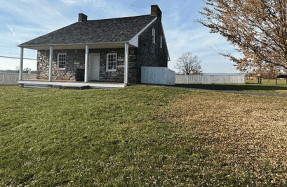
William S. Love of the 1st Special Battalion of Louisiana Infantry had little time to revel in his army’s victory at the First Battle of Manassas. For nearly three weeks, the Confederate surgeon from New Orleans found himself “constantly employed” treating wounded from both sides at the Carter House, a Manassas hillside homestead now serving as a field hospital. Finally, on August 9, 1861, Love fired off a quick note to his father, apologizing that it had taken him so long to do so. “I have had charge of some thirty or forty wounded prisoners,” he professed. “I got rid of them two or three days ago and have now here only [Captain] George McCausland who had gotten into a conflict wounded in a duel [and] is not in a condition yet to be moved.”
The Civil War’s first major battle on July 21, 1861, had sent a shockwave across both sides of the fractured country. As the clash on the plains of Manassas, Va., teetered on the edge of an expected Union victory that many believed would quell the Southern states’ burgeoning rebellion, fate played its hand, allowing the combined armies of Confederate Generals P.G.T. Beauregard and Joseph E. Johnston to storm back and claim a victory.
Hand-picked to win it all, Union Brig. Gen. Irvin McDowell attempted a bold advance that morning against the Southern forces assembled both on Matthews Hill and along the Warrenton Turnpike. Buckling under intense pressure on Matthews Hill, Love’s Louisiana Tigers—along with their beleaguered comrades from South Carolina and Virginia cobbled together in Colonel Nathan “Shanks” Evans’ 7th Brigade—withdrew in disarray toward Henry Hill, where the Southern commanders settled into a defensive posture.
Flush with grandiose visions of victory, McDowell ordered his troops to “press the Confederates.” At midday, astride his horse, he galloped along his lines shouting, “Victory! Victory! We have done it! We have done it!” The Union commander’s euphoric cries, however, produced ill-advised inaction among many of his troops—and soon a Herculean effort by their Confederate counterparts.


Patiently awaiting the Union advance behind a slope near Henry Hill were an unassuming former Virginia Military Institute professor named Thomas Jonathan Jackson and his contingent of Virginia infantry. The subsequent stand by the Old Dominion native would become immortal, of course, as was the Confederates’ remarkable rally on the field, which by evening had the Union troops and hordes of resident bystanders scampering back to Washington, D.C., as fast as the roads would allow.
The Southerners had indeed grasped victory from the hands of defeat.
he letters Love finally sent to his father, parts of which are published


